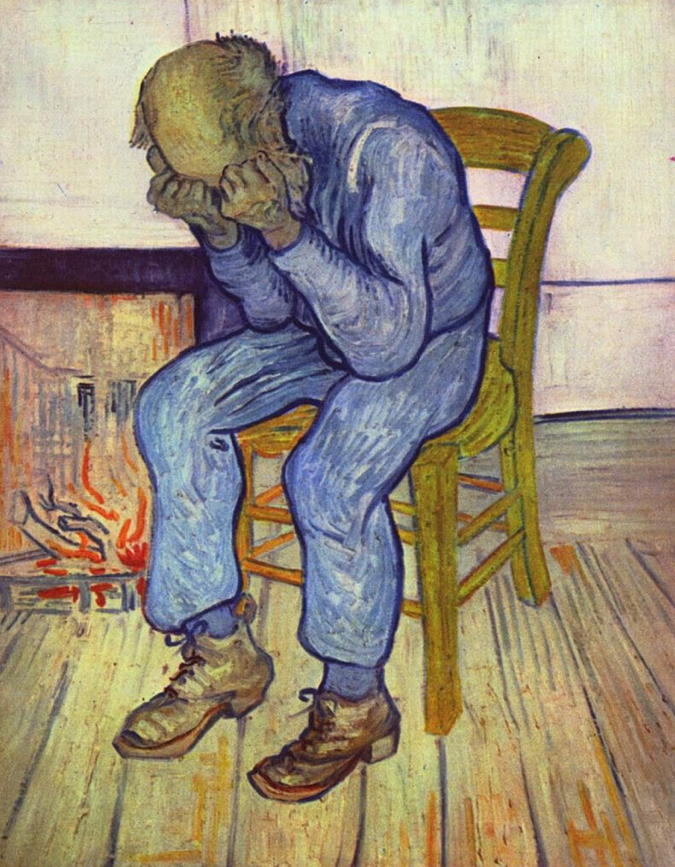Laughing Together, Weeping Alone
William Hogarth, The Laughing Audience
Vincent Van Gogh, Old Man In Sorrow
I was at home watching a film when it happened again. A drying of the throat, a tightening of the vocal cords, the involuntary dab at the side of the eye to discover a bead of moisture forming. Yes, I was crying again.
I’m no motor racing enthusiast, but I was cracking up over the Senna documentary. The potent cocktail of youth, beauty, talent and tragedy. The story of a genius half expressed, a life half lived.
It’s a curiosity of middle age that one finds oneself weeping more frequently. Sometimes it’s prompted by the profound. But often it’s the incidental, the humdrum, the everyday. A fay costume drama, a moderately emotional screwball comedy, a random memory of Dylan, the springer spaniel, watching sparrows on the summer lawn.
I sat next to a guy on the plane a while ago. A formal, serious looking man with one of those bulky lawyer’s briefcases that mean money and business. He obviously travelled a lot. After take-off he set out his paraphernalia for in-flight comfort: his unguents, earplugs and blindfold. He refused food, switched on a monitor and proceeded to cry profusely all the way through Four Weddings and a Funeral.
I’m not sure about the psychology or physiology of Middle Aged Weeping. Could it be the remembrance of things past, the wisdom of age, the diminution of testosterone, the proximity of death, the fear of apocalypse? Or all of the above simultaneously tugging at the heart strings and demanding a tune?
I’d like to say I’ve gained some lasting benefit or resolution from my weeping, that I am more in touch with my emotions, more at one with myself. But, whilst I am certainly curious about it, I don’t feel any farther down the road to self knowledge. Tears are not enough.
Maxine Brown
I cry alone
When no one else can hear me
When friends come by to cheer me
I smile and say I feel OK.
Maxine Brown, I Cry Alone
With the exception of a few funerals, like Maxine Brown I have always cried alone. Context evaporates, time stalls, the world closes in. Melancholy is a matter of silent isolation.
Conversely I only laugh with others. To share the joke, to join the fun, to feel peels of laughter rippling through the crowd. The greatest highs are the ones we share. And solitary laughter is the surest sign of oncoming madness. As the guy on the 19 bus giggles out loud at the contents of his book, one edges along the seat a little farther, grips the handrail a little tighter. I suspect more people write LOL than do it.
Take a look at anyone’s Facebook photos and you’ll see a curiously hedonistic sense of self. The laughter, smiles, gatherings and getaways of friends and family. Darker thoughts and feelings are generally suppressed. It’s a redacted life.
I wonder what does this mean? Are we instinctively predisposed to share our highs and keep the lows to ourselves? Are some feelings inherently more private and others more public? Are there natural limits to the social?
I’m aware, of course, that some societies cry more freely than mine. Perhaps others laugh more privately too. And conventions are changing. We live in an age where the instinct to share has extended beyond the joyous and celebratory. Oprah’s openness, misery memoirs, celebrity confessions. Some have speculated that the social era may lead us to happier personal lives, that in our free expression on the web, we’re engaged in some kind of mass therapy: we’re producing the best adjusted generation since before The Fall.
Nonetheless, I share the growing concern that our transparent world poses challenges in the area of privacy. Hitherto much of the debate has centred around personal data, unsolicited targeting, embarrassing photos. I suspect privacy may represent a more profound issue than this. Privacy is a matter of personal identity. And in order to prevent identity theft in the truest sense, we need to protect the arcane, opaque, mysterious elements of our own lives. In her new book, Quiet, Susan Cain suggests that the ‘world that can’t stop talking’ underestimates introverts. I agree.
Van the Man once sang about the ’Inarticulate Speech of the Heart’. I had grown up thinking that any belief needed a justification, that an emotion wasn’t properly felt unless it could be articulated, that one couldn’t recover from a trauma unless one could describe it. Now I treasure the unexplained, the unspoken, the unthought.
First Published: BBH Labs 02/04/12
No. 12


